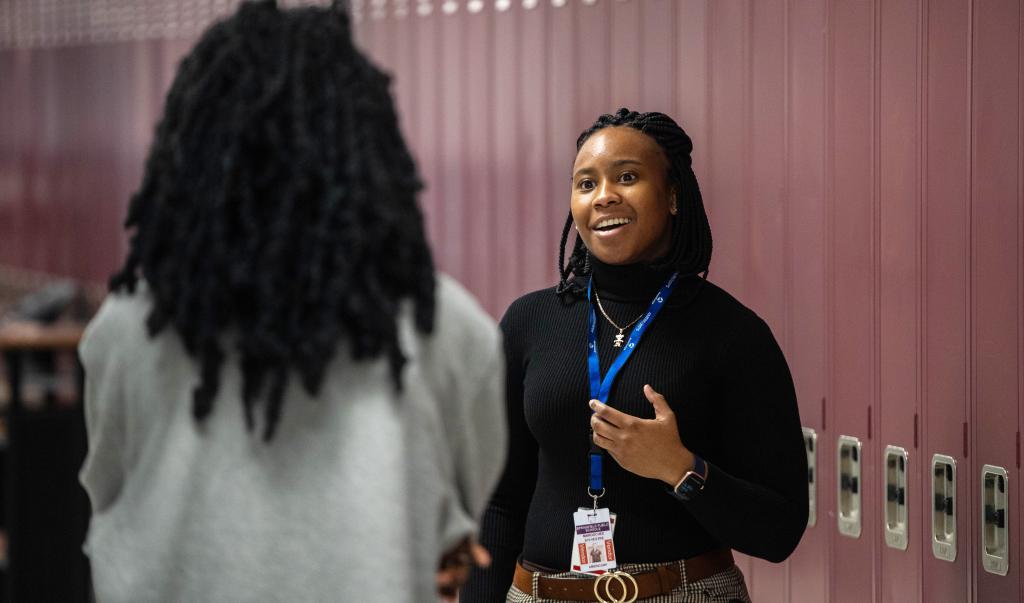School Counseling
| About This Program | |
|---|---|
|
Admissions Contact
Kristen Tantillo Are you an International Student? |
|
Curriculum and Delivery
|
|
Start Dates and Duration
|
|
| Graduate Success and Careers | |
|
Already have your Master's Degree?
Looking for post-graduate programs? Explore our Certificate of Advanced Graduate Study (CAGS) in school counseling. |
|
|
The Office of Educator Prep and Licensure can help answer your school counselor licensure questions. |
|
| Paying for Your Education | |
| Upcoming Events | |

Support Student Development and Well-Being.
In today’s day and age, students from elementary to high school face different challenges, both academically and emotionally. Schools across the country, especially those with urban and traditionally underserved populations, need school counselors who are educated, prepared, and caring.
With a strong emphasis on fieldwork, the Springfield College MEd in School Counseling prepares students to take on the multifaceted roles of today’s school counselor. This includes the development of skills to counsel and assess youth, serve the needs of a diverse student population, and effectively collaborate with students, parents, and school personnel.
The program has a unique academic balance of education and psychology, which allows students to be exposed to the full scope of situations they may encounter in the field. Students can gain eligibility for Educator Licensure in both School Counseling and Adjustment Counseling.
School counseling alumni take this mission to heart and put into practice the philosophy in their schools, benefitting those who need it most and truly making a difference in the lives of their students and communities.
How to Apply:
Admission Requirements
- Complete the online application: Once your application form is processed you will receive an email with your application portal login credentials and instructions for submitting supplemental materials as listed below.
- Essay: In two to three double-spaced pages, please describe significant life experiences that have contributed to your interest in your field, your understanding of this field, your occupational objectives, and why you have chosen Springfield College.
- Resume: Please include any college activities, out-of-school leadership experiences, work history, and community involvement to support your interest in or qualifications for graduate study.
- Two letters of recommendation: Two letters of recommendation from a faculty member or direct supervisor: Recommenders will receive an email when you submit your application and will be able to upload your letter to your application.
- Interview: This program requires an interview.
- Transcripts: An official transcript from each college/university you have attended is required. In order to be considered official, transcripts must be received directly from the original source, by email to graduate@springfield.edu or mailed to the college address:
Springfield College
Office of Graduate Admissions
263 Alden Street
Springfield, MA 01109
International Applicants
- $100 non-refundable International Application fee
In addition to the above admissions requirements, all international applicants from non-English-speaking countries are required to submit:
- Proof of English language proficiency by way of the TOEFL or IELTS: Other tests may be accepted on a case-by-case basis. Please refer to our language requirements for more information on acceptable tests, minimum scores, exemptions, and conditional acceptance. If your undergraduate degree was earned in the United States and you successfully completed college-level English, we will consider English language proficiency met.
- Please note: Transcripts must be in English. If the transcript is not in English you will be required to submit a professional credential evaluation completed by any member of the National Association of Credential Evaluation Services (NACES). For this we recommend SpanTran, with its customized portal for Springfield College applicants. World Education Services or Josef Silny & Associates, Inc. are also recommended for your credential evaluations.
The Office of International Admissions can assist you with questions you may have about enrolling at Springfield College as an international student by emailing intladmissions@springfieldcollege.edu.
Application Deadlines
Domestic Students
- Applications are reviewed on a rolling basis as space is available.
International Students
Fall Start:
- Application and Supporting Materials Deadline: May 1
Summer Start:
- Application and Supporting Materials Deadline: February 1
